» posted on Thursday, December 31st, 2020 by Linda Lou Burton
Don’t Cry for Me
Originally posted December 31, 2005 by Linda Lou Burton from Buenos Aires, Argentina – The year was winding down. The trip was winding down. And I was winding down too. Breakfast at 7 in 214, part of the tour stuff, Antarctic adventurers sitting together one more time over eggs and toast. Unassigned table, suddenly I’m with a bunch of Americans, most I hadn’t encountered on the ship. South Carolina, Myrtle Beach, Clemson; Connecticut; New Hampshire; we met in Buenos Aires!
Downstairs, the City Tour at 8. Maria. Maria, blond, slender, people-savvy. Maria knew her city, Maria knew her facts. She told her story golden voiced, syllables stretched slowly into bells, a lovely melody. First corner, a pause. The Opera House. Teatro Colon. Colon Theatre. Known worldwide for its excellent acoustics. One of the world’s premier opera houses. Maria Callas, Toscanini, Stravinsky, Caruso.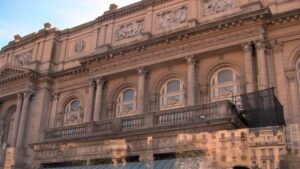
We drove on. I snapped my pictures through tour-bus windows. Time, too short. Maria told grand stories about the city, melody creating mood, as we moved through the Centro district, San Telmo, Montserrat, Palermo, La Boca, Puerto Madero. First stop, Recoleta Cemetery. One of the most famous cemeteries in the world. Founded in 1822. Six hectares in size. Famous sculptures, crypts, graves where famous people rest. Historic monuments. Important mausoleums, such as Evita’s, other national heroes, writers, Argentine Presidents.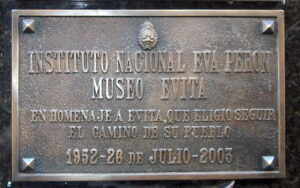
The bus pulled to the edge of the brick-walled haven of quiet and Maria began her story. Eva Duarte, who married Presidente Peron, a woman of the people, then first lady of the land. Evita! “We’re going to walk around inside,” Maria told us, “and though we believe it is safe in our city, I ask that you leave all jewelry and valuables in the bus.” Since I had only two small cameras — one for each zip-up pocket — I was good to go. We had 20 minutes inside the walled cemetery.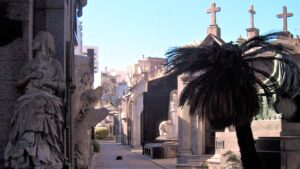
Cats wandered lazily, or curled in a spot of sun. Lives to spare? Maria told more stories. Tour mates darted into walkways for the perfect shot — the angle of an angel’s wing; a name carved in marble, long ago. Long forgotten? A man with a cane, walking alone. Trees shaded the peaceful sighs of the dead, resting now. 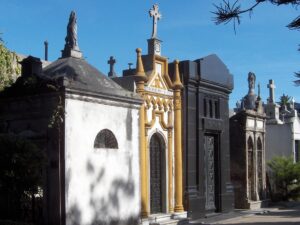
Maria disappeared. I could hear no voices, do I go right, or left? I saw the church ahead, hurried to catch up. The Nordnorge sign, lifted high, passing through the gate. Across the street purple flowers beckoned to my camera. Maria and the bus beckoned too. Hurry. I jumped aboard, snapped McDonald’s on the corner as we drove away, on fast-food time.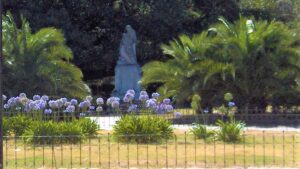
Second stop, Plaza de Mayo. The city center. Site of Argentina’s most important historical events. Surrounded by Government House, Metropolitan Cathedral, Town Hall, Bank of Argentina. Maria’s history lesson flowed through the bus as we made each turn around the square.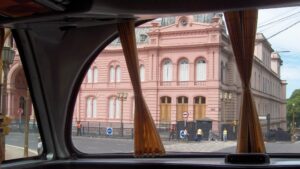
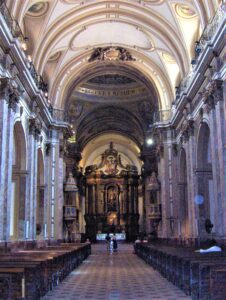 The driver eased the bus to the curb in front of the Cathedral. “Twenty minutes,” Maria said, before she allowed us out the door. “Be back here in 20 minutes.” I stepped into the heat, surrounded by tour buses, radio taxis, tourists, beggars, vendors, orange-vested policio; jumbled real-time and past-time meeting on the square, under a last-day-of-the-year blue sky. Will I be a part of Plaza history now, or will it be a part of me?
The driver eased the bus to the curb in front of the Cathedral. “Twenty minutes,” Maria said, before she allowed us out the door. “Be back here in 20 minutes.” I stepped into the heat, surrounded by tour buses, radio taxis, tourists, beggars, vendors, orange-vested policio; jumbled real-time and past-time meeting on the square, under a last-day-of-the-year blue sky. Will I be a part of Plaza history now, or will it be a part of me?
The Cathedral portico was lined with beggars; women crouched as crippled; children brushed the arms of passers-by, pleaded. I had nothing in my pocket but cameras. Inside, I offered prayers. The church was huge, ornate, saints and sinners mingled under gold and blue, death and life. Symbols. Faith. And hope. I prayed for children everywhere.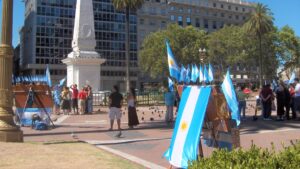
The sidewalk now, vendors hawking Argentinian leather purses, jewelry, t-shirts, flags. Wait patiently for the light to change. Across the street, the Plaza. No demonstration today. But the black fence was there, stay back, stay back, stay this far from Government House. Today it had no use. The Policio were chatting, enjoying the sun.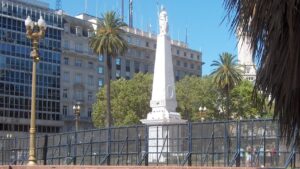
Tour buses made the turn only a sidewalk-width from the pink walls of Government House. I walked to the front for pictures, stood under the palm trees, saw two guards standing at attention beside the door. I could never get this close to the Capitol in Washington DC. What does this mean, as I stand in the heart of the fourth-largest city in the world? What does it mean about my country?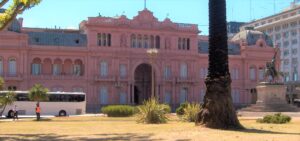
My twenty minutes were gone. Children and pigeons played in the sunshine of the Plaza, while grown-ups rested on nearby benches, a summer holiday. The blue flag of Argentina decorated the vendor’s stands, hand-sized versions for sale. But I had no money in my pocket, I had to hurry, run, hobble-run through the crowd, waving, waving at Maria, who stood by the door of the bus, ready to move on.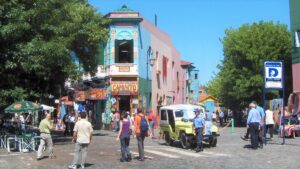
Third stop, La Boca. Little Italy. Mediterranean style. Brightly painted wood and corrugated tin houses inhabited by families, artists, musicians. One of the most picturesque places in the city due to its colorful port setting, said the brochure. A working class neighborhood located at the mouth of the river (La Boca means The Mouth). Main street is Caminito.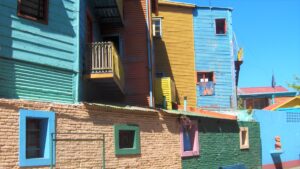
We knew before she said it. “The bus will stop for 20 minutes.” I was out in a flash. The street was only two blocks long, but I wanted to absorb the color, the noise, the feel of the place. I walked rapidly to the turn-around spot where I saw boats and river, timing the time I had to leisurely stroll the cobble streets back to the bus.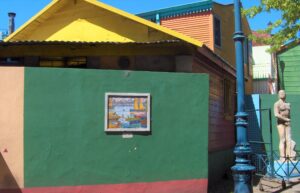
Blue. Pink. Yellow. Green. Color everywhere, on everything, unexpected curves and angles, a painting hung below a window on a wall of brilliant blue, a wood-carved head jutting from a ledge, flowers, cats, voices, music, caricatures, exaggerated smiles, stick-your-head-in-the-hole-and-get-your-picture-made, postcards for sale, trinkets, souvenirs. A playful place.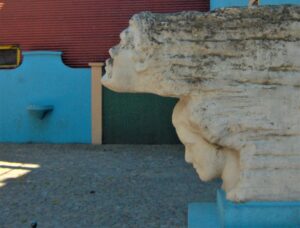
Back at the bus, Maria was not there, the driver was not there, the door was closed. We gathered, watched a dog lazing in the door of a shop, knowing this was almost the last thing we’d do together. We did not mind Maria’s tardiness. Here there were trees, a life-sized papier-mache cow to keep us company. Ross confessed, he took a pebble from the shore on one of our Antarctic stops. Mary fussed, told him he is a lout. Maria arrived, and we were on our way. Did Ross understand?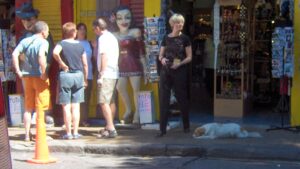
Time was almost up. The bus followed the river, Puerto Madera now, renovation, beautiful new buildings along the water. Offices below, condominiums above, expensive, glitzy, gorgeous; finest restaurants in town here now. The tires of the bus were almost squealing as we hurried back, moving fast, there were planes to catch. Back at the hotel, I packed my bags and turned them over to the concierge to wait for our 3 o’clock airport shuttle. Noon checkout was required.
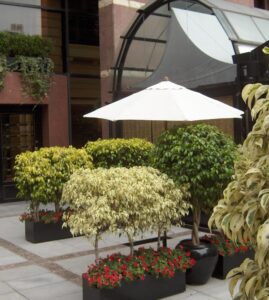 Needed lunch. Mostly, needed something COLD to drink. It was hot and humid in the lobby, although the hotel staff were dressed in fancy-dancy suits and ties. I checked the temp with the laser-thermometer I keep in my pack. 84 degrees. Meltdown. I headed for the beautiful terrace restaurant at the back of the hotel lobby. Locked! The bar was not an option, cigarette smoke swirled in blue clouds around the plush and comfy chairs. Grrrr. I walked to the back patio, checked the restaurant’s outside door. Locked. I shook and rattled the door, it was after noon and the sign said Open 11 AM. It opened. “May I help you, Senora?” “I’m looking for lunch!” I replied, gruffly. “Then please to come in,” he smiled. I walked inside. It was hotter, muggier, steamier, than the lobby. “Don’t you have air conditioning?” I asked with attitude. “Why is it so hot?”
Needed lunch. Mostly, needed something COLD to drink. It was hot and humid in the lobby, although the hotel staff were dressed in fancy-dancy suits and ties. I checked the temp with the laser-thermometer I keep in my pack. 84 degrees. Meltdown. I headed for the beautiful terrace restaurant at the back of the hotel lobby. Locked! The bar was not an option, cigarette smoke swirled in blue clouds around the plush and comfy chairs. Grrrr. I walked to the back patio, checked the restaurant’s outside door. Locked. I shook and rattled the door, it was after noon and the sign said Open 11 AM. It opened. “May I help you, Senora?” “I’m looking for lunch!” I replied, gruffly. “Then please to come in,” he smiled. I walked inside. It was hotter, muggier, steamier, than the lobby. “Don’t you have air conditioning?” I asked with attitude. “Why is it so hot?”
“We have the glass roof, so we cannot stop the sun come in,” he said, “but we have the fan so you can sit under,” he gestured to a table directly beneath a slowly whirling fan. The room was beautiful, filled with palm trees, climbing vines, orchids, even the song of birds, a tropical jungle-haven. Just ahead the luncheon buffet was spread, the display itself nothing less than a work of art. The table legs were different heights, each course set up at different levels to catch the eye; the plates were huge, and square, perfect for a buffet gorge. I walked around the multi-layered food, entranced. “I guess I’ll stay,” I mumbled. “But only if you have ice.”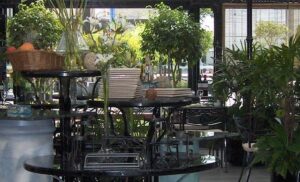
“Si, Senora,” he said, pulling out my chair. He brought a bottled Coke, cold from the cooler. He brought a tall sipping-glass. He brought an entire bucket of ice. “Please to help yourself, Senora,” he said, when he saw I had begun to cool down. “Is all for you.” He gestured to the food display. It was true, there were no other customers in the room, and the fabulous assortment of meats, fish, salads, vegetables, desserts, and breads was, in theory, mine.
This was the first moment since my trip began that I’d had so much privacy, so much personal attention, so little need to hurry. I suddenly felt queenly, rested, back on top of my game.
Don’t cry for me, Argentina. I will remember you well.
